“Goodbye Christopher Robin” tells of the unavoidable distance between parents and their children, and the nostalgia for a lost home.
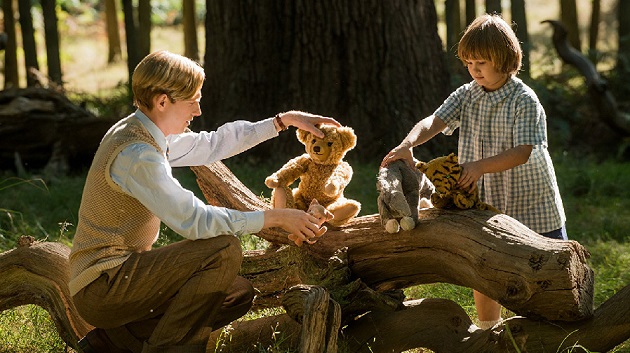 A. A. Milne wrote the Winnie the Pooh stories for his son Christopher Robin in the 20s.
A. A. Milne wrote the Winnie the Pooh stories for his son Christopher Robin in the 20s.
C.S. Lewis said that “a story worth reading only in childhood is not worth reading even then”.
If you believe that the stories of Winnie the Pooh are nothing more than stories for children, you must not have got any further than the Disney animation.
That version of the story of Christopher Robin, now portrayed by Ewan McGregor in the latest film playing in cinemas all over the world, does not compare to the marvellous British film that came out last year, “Goodbye Christopher Robin”.
This exciting story for adults tells of the unavoidable distance between parents and their children, the insurmountable pain that accompanies us through life and the nostalgia for a lost home that we cannot find in this world.
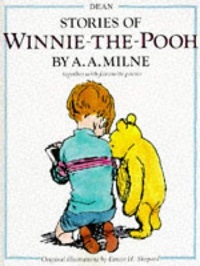 Winnie The Pooh films were made by Disney, which has held the rights since the 1960s.
Winnie The Pooh films were made by Disney, which has held the rights since the 1960s.One of my first childhood memories of my mother, who I lost early on, is her reading the Winnie the Pooh book to me at bedtime. It was an edition published in Barcelona in 1968, which is now falling to bits, even though I bought it again second hand.
The cover showed an image of the film made by Disney – which has held the rights since the 1960s –, but the text was by Milne, and the illustrations the original 1920s ones by Shepard.
I too, like Christopher Robin, had a teddy bear. It was given to me by a lady in Scotland, when I was in an orphanage for the children of missionaries murdered in Africa. This home in Arbroath has now closed down and is in ruins, but the Teddy bear came back with me to Madrid.
I used to sleep with him and I still have him at home. I tried to see Christopher Robin’s teddy bear in New York, when it was exhibited in the public library, behind a glass with the other stuffed toys that inspired the stories. They had been donated by the publishers but were being restored on the day that I visited.
SOLITARY CHILDHOOD
Although the son of the author of these stories shared his name with the main character, Christopher Robin, his parents called him Billy Moon. His mother wanted a daughter, and the film suggests that it was for fear that a son would have to go to war, like the father, who was traumatized by his experiences in the First World War.
They had planned to call a girl Rosemary, but when they had a boy they first started calling him Billy – although he was not baptized as William. When he was little, he had trouble pronouncing Milne, and the name “Moon” stuck – Billy Moon.
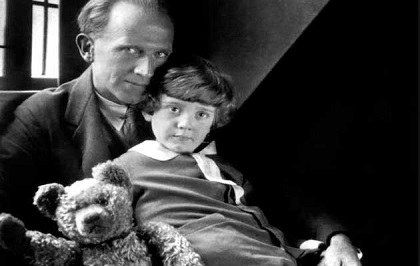 A. A. Milne wrote the Winnie the Pooh stories for his son Christopher Robin in the 20s.
A. A. Milne wrote the Winnie the Pooh stories for his son Christopher Robin in the 20s.Although his parents were able to disassociate the character from the person of Christopher Robin, the public could not, and the popularity of the stories ruined his childhood. Used to promote the books, Christopher ended up being exploited until reaching breaking point.
The only person who sought to protect him was his nanny Olive, whom he called Nou – wonderfully played by the Scottish actress Kelly Macdonald. His mother was traumatized by his birth and his father by the war.
Although he was a lonely child, both parents washed their hands of him in a way that is hard to understand in an age that idolizes children to the extreme. In that social class, it didn’t seem strange for the parents to go off to Italy for six weeks, as his parents did, leaving their new-born child with the nanny.
The family started off living in London, but “shell-shock” from the First World War meant that his father could not stand the noises of the city, and they moved to the countryside. Cotchford farm, near the Ashdown forest in East Sussex, is still a place of pilgrimage for Winnie the Pooh fans.
That is where Christopher Robin grew up with his nanny, while his mother enjoyed London in the crazy 1920s and his father retreated to write.
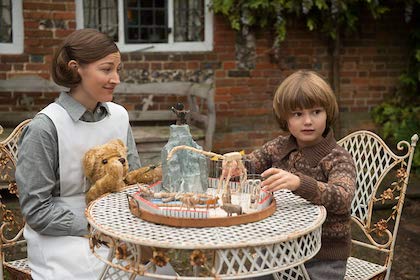 The only person who sought to protect him was his nanny Olive, whom he called Nou – wonderfully played by the Scottish actress Kelly Macdonald.
The only person who sought to protect him was his nanny Olive, whom he called Nou – wonderfully played by the Scottish actress Kelly Macdonald.It was a solitary childhood, but he was accompanied by the teddy bear he called Winnie, after the black bear from Winnipeg, Canada, that he had seen at the London Zoo. They had hundreds of adventures together in the “Hundred Acre Wood”.
PARENTS AND CHILDREN
The tormented character of his father, wounded at the Battle of the Somme, created an even greater distance than is normal between parents and children. The stories of Winnie the Pooh were their only emotional bond.
The film shows how Milne creates them by exploring the nearby wood with his son, over a period of time when it was just the two of them, since the nanny’s mother had died and his wife was in London. Daphne – as they called the mother , although her real name was Dorothy de Sélincourt– also did the voices of the stuffed animals in a vain attempt to connect with her son.
Christopher Robin’s resentment towards his parents led him to want to do the thing that they most feared: at the age of 18 he signed up to fight in the Second World War.
In combat, their worst nightmares became reality when he was reported missing in action. He surprisingly came back but then got married to a cousin, despite his mother’s opposition.
He visited his father when he became ill, but he did not see his mother again, even when she was on her death bed. He himself had a daughter, but she was born with a cerebral illness. He opened a bookshop, but he never accepted the author’s rights that his father offered him for the stories of Winnie.
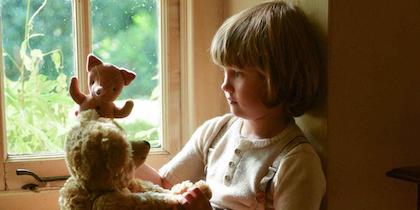 Christopher Robin had a a solitary childhood.
Christopher Robin had a a solitary childhood.I have listened to an interview that he gave to the BBC in the 1970s. Like his father, he finds it hard to express his emotions, but after his death he seems to have come to terms with his memory, although he doesn’t recognise any other mother than his nanny.
It is difficult to put oneself in one’s parents’ shoes. At bottom they are strangers to us. We only know about their lives from the point that we become conscious of them, but there really remains a lot that we do not know about them.
RETURNING HOME
A.A. Milne dreamt of a world without wars. He wanted to write a pacifist treaty when he came back from the First World War, but he did not manage it until 1934. In the film, his wife is sarcastic about his idealism.
Writing against wars seems to her as un-real as writing a book against Wednesdays. That won’t make them disappear. I suppose that that is the reason that he did not like the Old Testament.
Milne said that it was responsible for the greatest atheism, agnosticism and incredulity. He believed that it had emptied more churches than the cinema, motor cycles and golf courses.
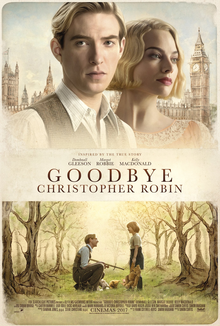 The version of the story of Christopher Robin, now portrayed by Ewan McGregor, does not compare to the marvellous British film that came out last year, “Goodbye Christopher Robin”.
The version of the story of Christopher Robin, now portrayed by Ewan McGregor, does not compare to the marvellous British film that came out last year, “Goodbye Christopher Robin”.I imagine that his father’s failure to understand the God of the Old Testament is also behind the description that a newspaper gave of Christopher Robin, after Milne’s death, considering him to be a “dedicated atheist”.
If faith is for many the desire to have a Father in heaven who looks after us, his absence is doubtless the psychological explanation of the atheism of those who have grown up without a father figure. Stories like these make us worry about our own children, given that many parents are far from being what they should be.
Christopher Robin’s passage from confusion to bitterness opens a window onto the hope in the understanding that comes with maturity. This understanding, however, does not go so far as understanding the pain that would explain his mother’s behaviour, beyond her apparent malice.
For that we need a greater father than the one we can have here on earth, He who knows us better that we know ourselves. He is the one who formed us in our mother’s womb (Psalm 139:13), who hears our unuttered cries and hides away our tears (Psalm 56:8).
The God of the Old Testament isn’t that terrible figure that Milne speaks of. He is the one that Jesus calls Father, showing us that he is no different to Him. John 14:9 says that whoever has seen Him, has seen the Father.
In Him we find the eternal home that we won’t find in our lifetime, the consolation and joy of a lost childhood that we cannot recover, however great our nostalgia. “There is more to life that balloons and honey”, Robin says to Pooh, but he replies: “Are you sure?”.
A banquet is being held in the Father’s house. In his garden stands the tree of balloons and honey that grows upwards forever. There, even Eeyore will jump for joy. When we ask ourselves where our home is, we must remember that Christ shows us the path that will lead us back home (John 14:6).

Las opiniones vertidas por nuestros colaboradores se realizan a nivel personal, pudiendo coincidir o no con la postura de la dirección de Protestante Digital.
Si quieres comentar o